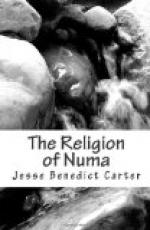was his grasp of the psychological problem which explains
his reorganisation of religion. A century of
civil war had totally destroyed the spirit of unity
and created an infinite number of petty hatreds between
man and man. Men had looked so long at their
individual interests that they had almost forgotten
the existence of the state. But if the spirit
of patriotism could be quickened into a new life,
then men would think of the state and forget themselves,
and united in their love of this one universal object
of devotion they would learn a lesson of union which
might gradually be extended to their whole life.
But the state must be presented not as it was in all
its wretchedness, lacerated by civil struggle; the
sight of the present would serve only to start the
quarrel over again; instead it must be the ideal state,
a state so far away, so distant from all the citizens,
that they all seemed equally near. If this state
were to be something more than a mere abstraction,
it could be clothed only in the reverential garments
of the past, it must be the Rome of the good old days.
Yet if they were not for ever to mourn a “Golden
Age” in the past and a paradise that was lost,
there must also be a hope for the future, a paradise
to be regained. In a word the belief in the eternity
of Rome must be instilled into men’s hearts.
Thus was the idea of the “eternal city”
born, and it is no mere coincidence that the first
instance of this phrase in literature occurs in Tibullus,
a poet of the Augustan age. Once convinced of
the eternity of Rome men could look at the past for
inspiration in full confidence that the beauties which
had been could be obtained again. But Augustus
was more than a sentimental enthusiast, and he saw
that it was not enough for men to drop their swords
at the epiphany of “Roma Aeterna,” that
their eyes would grow weary and looking to earth would
behold the swords again. These swords must be
beaten into ploughshares and pruning hooks; the deserted
farms of Italy must be filled again, and the stability
of the state must be increased by an enlargement of
the agricultural community. But for the accomplishment
of these reforms something was needed which was at
once gentler and stronger than legal enactments.
The poet must make smooth the way of the law.
It was the poet who could best interest men in the
past; and thus Augustan poetry was encouraged and directed
by the emperor, that by pointing out the glories of
old Rome it might inspire men to make a new Rome more
glorious than the old. Practically every poet
of the age was directly or indirectly under the influence
of the ruler. It was the emperor’s counsellor,
Maecenas, who encouraged Virgil to write his Georgics,
and these glowing pictures of farm life did quite
as much to carry out the emperor’s plans as the
Aeneid later. And Virgil was not alone
in writing of country life; Tibullus, even more gentle
than the gentle bard of Mantua, was telling the same
story in another form.




